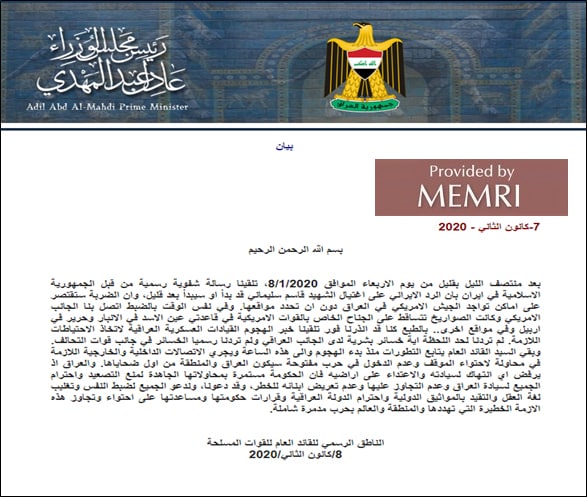After some delay, Iraqi government and political leaders reacted to the Iranian missile attack, which took place on Iraqi soil, highlighting internal division over the attack.
Following are some of the reactions:
Iraqi lawmaker Faiq Al-Sheikh Ali of the Reform Movement, known for his disapproval of Iran's growing influence in Iraq, posted a tweet that[1] mocks Shi'ite cleric Muqtada Al-Sadr's threats[2] against the U.S. and President Trump, while condemning the Iranian missile attack, saying: "I vow by the lord of the dancers [...] that Iran will not dare to fire a bullet from a gun on a U.S. national in any U.S. base in any country aside from Iraq. It [i.e. Iran] has no respect though for our country and our people and there is no respectful man to discipline it."

(Source: Twitter.com)
In reaction to Iran's missile attack on an Iraqi military base housing U.S. and Iraqi troops, Iraqi caretaker Prime Minister and Commander-in-Chief Adel Abdul-Mahdi released a statement[1] on January 8, saying that he was notified by Tehran that its response to the assassination of Iranian General Qassem Soleimani was "either imminent or under way."

(Source: Pmo.iq)
The statement explains that shortly after midnight on January 8, he received "a verbal message from the Islamic Republic of Iran that the Iranian response to the assassination of the martyr Qassem Soleimani had started, or was about to start, and that the attack will be limited to U.S. military sites in Iraq without specifying which."
At the same exact time in which Abdul-Mahdi received the verbal message from the Iranians, the U.S. commanders in Ain Al-Asad military base in Anbar, Harir base in Erbil, and other bases contacted Abdul-Mahdi, says the statement, elaborating that by then "the attack was happening."
The statement further explained that Abdul-Mahdi warned "Iraqi military leaders," and asked them to take precautions once he received the information from Tehran.
Confirming that the attack caused no casualties among Iraqi military personnel, the statement notes that the Iraqi government rejects any violation of its sovereignty and acts of aggression on its land, and also calls on all parties to practice self-restraint and respect for the Iraqi state and its decision.
Iraqi President Barham Saleh issued a brief statement on January 8, saying that he discussed with the Secretary-General of the United Nations, António Guterres, the recent developments in the region, and warned that Iraq should not be a battlefield for the conflicts of other nations.

(Source: Twitter.com)
He also denounced the attack in a tweet,[2] calling on all Iraqi political parties "to favor Iraq's interests and avoid conflicts that could only bring destruction to Iraq".
Earlier, Kurdistan Democratic Party (KDP) leader Masoud Barzani commented on the attack in a statement[3] that says "a very dangerous situation has emerged in the region and Iraq in the last few days, and a great threat is felt everywhere. In such conditions, reason and logic should be used to find a solution rather than useless emotions."
Abu Alaa Al-Walai, leader of Kata'ib Sayyid Al-Shuhada, which is a Popular Mobilization Units (PMU) group, responded on Twitter to President Trump's tweet[4] after Iran's attack, saying "America is the mother and father [i.e. source] of lies, its losing men, women, money, and history but it says: All is good!!"
Addressing Americans, he pledges to expel them in a humiliating manner, adding that the attack in Ain Al-Asad military base is just a "drop of rain, with heavy rain that will follow." He concludes: "Wait for us, we won't forget the spilled bloods and shall not forget to seek vengeance for the martyrs."

(Source: Twitter.com)
Iraqi Shi'ite Cleric Muqtada Al-Sadr, leader of the Sadr Movement, issued a statement[5] late on Wednesday questioning why PM Abdul-Mahdi received calls from "both parties" [i.e. the U.S. and Iran] before the attack. "Did he approve it or did he not? God knows," he asks.
After listening to President Trump's speech, and hearing Iran's remarks, he concludes that the crisis is over. He further calls on Iraqi politicians to select a candidate for the position of Prime Minister within 15 days, in hopes that this will help expedite the departure U.S. forces. He further advises armed factions to not carry out any attacks, and also recommends the closure of all PMU offices and bases, so that if the PMU "pursue the path of resistance, should the occupiers refuse to leave," it will be more difficult to target them.

(Source: Twitter.com)




